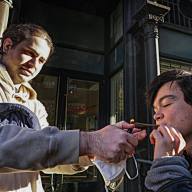WASHINGTON – Hillary Clinton scored an expected landslide Tuesday in West Virginia that did little to break Barack Obama’s hold on the Democratic nomination but emphasized concerns about his ability to win over working-class voters this fall.
It was one of the few high points left for the beleaguered Clinton as she plays out the remaining five contests of a topsy-turvey race many once thought was hers for the taking.
The focus has been on why she’s staying and how she’ll stage her exit since her chances now of catching up to Obama’s lead in delegates are so remote.
And while she vowed to stay in and fight to win until voting ends June 3, she also praised Obama and promised she’d “work her heart out” to help push him to the White House in November’s general election if he becomes the nominee.
“We’ve had a few dustups along the way,” she told supporters in Charleston, W.Va., “but we have always stood together on what is most important.”
Clinton has made it clear her supporters want her to stick it out and many would undoubtedly be infuriated if she were pushed before the primary season ends.
By going the distance, analysts say, she could be bargaining for the vice-president’s job or hoping for help from Obama in eliminating some $20 million in campaign debt.
There is also the opportunity to put her stamp on party policy as she waits out the finale and, of course, the possibility of a bad stumble from Obama that could change the dynamics.
“I am more determined than ever to carry on this campaign until everyone has had a chance to make their voices heard,” Clinton said.
“This race isn’t over yet. Neither of us has the total delegates it takes to win.”
Her success among white, blue-collar workers in West Virginia gave Clinton another chance to showcase Obama’s weakness among those voters that’s been apparent in other key states like Ohio and Pennsylvania.
Clinton, who was winning by more than two to one, contended her victory is more evidence she’d more easily beat Republican John McCain in November.
No Democrat has won the White House without taking West Virginia since 1916, she said.
“The White House is won in the swing states and I am winning the swing states,” said Clinton.
That’s the argument she’ll be taking again Wednesday to superdelegates – the party officials and legislators who will decide the nominee – but she faced a tough road swaying too many at this point.
They’ve been moving steadily toward Obama despite his challenges, giving him an ever-increasing lead considered insurmountable. He also tops Clinton in states won and the popular vote.
Heading into West Virginia, he had 1,875 delegates of the 2,025 needed to win, compared with 1,697 for Clinton.
Obama, who conceded West Virginia early, anticipated renewed concern about his electability while campaigning in Missouri.
“There’s a lot of talk these days about how the Democratic party is divided,” he said.
“But I’m not worried because I know that we’ll be able to come together quickly behind a common purpose.”
West Virginia exit polls pointed to other potential pitfalls for Obama, including the enduring impact of contentious racial rhetoric from his ex-pastor Rev. Jeremiah Wright.
About half of voters said Obama shares Wright’s views, either “a lot” or “somewhat.”
Race, too, is still a factor in Obama’s drive to become the first black U.S. president, with one in four Clinton voters saying it influenced their choice.
And barely a third of Clinton supporters say they’d vote for Obama over McCain, indicating a major divide provoked by the nomination fight that’s yet to heal.
Yet many Democratic strategists hope that things will change once Obama is officially crowned.
“I’m for Senator Clinton, but I think the great likelihood is that Obama will be the nominee,” said James Carville, Bill Clinton’s former strategist.
“As soon as I determine when that is, I’ll send him a (campaign) cheque.”
There are five contests left, including Kentucky next week where Clinton is favoured and Oregon, where Obama has an edge.
Clinton faced loud calls from some to drop out after a loss to Obama last week in North Carolina and a very narrow win in Indiana sparked a growing consensus that she’d lost the battle.
“The math is controlling. This race, I believe, is over,” former Democratic party chairman Roy Romer said Tuesday.
“There is a time we need to end it and direct ourselves to the general election. I think that time is now.”
Many in the party aren’t buying her argument that Obama can’t prevail as easily in a matchup with McCain.
Or they see putting Clinton on the ticket as a way of combining her strength among women, seniors, Hispanics and working-class voters with Obama’s support from blacks, the young, affluent and well-educated.
Since last week, Obama’s virtually ignored Clinton on the campaign trail while setting his sights on the general election, planning trips to key states, like Missouri, Michigan and Florida.
A Washington Post-ABC News poll released Tuesday suggested Democrats have a good opportunity this fall.
Americans are gloomier about the direction of the country than at any other point in the last 15 years.
Democrats held a 21-point advantage over Republicans as the party equipped to deal with the problems.
Yet McCain remained competitive with Obama, indicating he’s not lumped in completely with dissatisfaction over President George W. Bush’s two terms.
For Clinton, it’s looking like a disappointing end to what many saw as a cakewalk last year, when she was the widely acknowledged front-runner with a huge team, lots of money and megawatt political star power.
But her campaign’s battle strategy was off the mark from the start, focusing almost exclusively on her experience and ill-prepared for the burgeoning appeal of Obama’s message of hope and change that drew big bucks and young voters in droves.
Clinton landed in trouble early with Obama’s surprising, impressive win off the top on Jan. 3 in Iowa, a contest she had been warned to skip in order to shore up Super Tuesday states the following month.
And she began to lose her support of African Americans who were offended by her husband’s anti-Obama comments in South Carolina that emphasized race.
Instead of the clincher her campaign expected, Super Tuesday’s votes on Feb. 5 ended in a draw. Clinton went on to lose 10 contests in three weeks, giving Obama a lead in delegates that she has been unable to overcome.
Clinton prolonged the race by becoming the champion of the working class, staging comebacks in Ohio and Texas in March and Pennsylvania in April,
But her weaker than expected showing in North Carolina and Indiana brought her up short, particularly since Obama had been struggling with the fallout of his ex-pastors’s angry outbursts.
While the epic nomination fight has been bruising, many analysts think it has served a key purpose – preparing Obama for battling Republicans.
“His backers are now less likely to enter the fall election campaign with any complacency,” said independent pollster Charlie Cook.
“They know where his weaknesses are and have some time to address those problems.”














